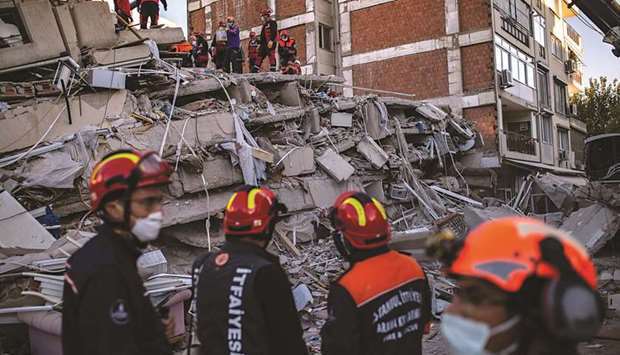A mother and three of her children were pulled to safety yesterday after being trapped for almost 18 hours under a building in the western Turkish city of Izmir that was flattened in a powerful earthquake.
One of the children succumbed to his injuries later in hospital, Health Minister Fahrettin Koca told reporters in Izmir.
The child was one of 37 people killed in Friday’s 7.0-magnitude quake: 35 in Turkey and two on the Greek island of Samos.
Rescuers were continuing efforts to free the woman’s fourth child.
The mayor of the Aegean port city said around 180 people remained trapped.
“In the meantime, we are delighted to be hearing miracles happening as a result of diligent work by rescue teams,” Mayor Tunc Soyer told television channel Fox TV.
The quake destroyed at least 20 buildings in Izmir, causing panic in the city and setting off tidal waves that slammed into coastal areas and islands.
President Recep Tayyip Erdogan, speaking in a televised address, said that 885 people were injured, 15 of them critically.
Koca, the health minister, said yesterday that 243 people were still being treated in Turkish hospitals, eight in critical condition.
Environment Minister Murat Kurum said more than 100 people had been rescued so far.
Rescue work was punctuated by hundreds of aftershocks: Turkish authorities registered nearly 600 aftershocks, dozens of them stronger than 4.0 magnitude.
By afternoon yesterday search operations had been completed in eight buildings and were continuing in nine others, officials said.
The recovery work was excruciatingly slow, punctuated by long silences in which rescuers – often stretched out on their knees, with their heads poking into open cracks – listened for signs of life.
As his family settled inside their white tent, Cemalettin Enginyurt, 51, described feeling “helpless”.
The retired soldier said his family’s home suffered “serious” cracks and he feared people being unable to tell if their homes were fit to return to.
“As it currently is and with the risk of aftershocks, we decided the solution was to stay outside,” he said.
One resident said both her parents were still trapped.
“I couldn’t get any news. I couldn’t get any news,” the woman told Reuters, when asked about attempts to reach them.
Bulldozers removed debris from collapsed buildings while rescuers dismantled walls by hand.
Workers set up 300 tents for those made homeless in the city, with 600 more tents on the way.
In Bayrakli, near Izmir, families and friends watched in agony, exhaustion and hope as workers painstakingly lifted slabs of flattened apartment blocks.
Jubilation, relief and tears of joy greeted every recovered survivor.
Cries of pain accompanied black bags holding bodies removed from the disaster zone.
“Let me see who it is!” one man shouted.
In small green spaces close to the damaged buildings, tents went up for frightened families to spend the night.
“It was so cold last night,” said Nilgun Yikariz, 59, who was sleeping on the grass in a small tent outside her destroyed apartment.
Nearby, Azize Akkoyun recognised parts of her family’s apartment in the ruins as she waited for news about her missing loved ones.
“Those curtains, they belonged to my daughter’s in-laws,” Akkoyun told AFP. “God willing they will come out alive.”
In a rare show of warmth between Turkey and Greece – caught up in a dispute over energy exploration rights in the eastern Mediterranean – Erdogan exchanged solidarity messages with Greek Prime Minister Kyriakos Mitsotakis on Friday.
“Whatever our differences, these are times when our people need to stand together,” Mitsotakis tweeted.
Erdogan responded in a tweet: “Turkey, too, is always ready to help Greece heal its wounds. That two neighbours show solidarity in difficult times is more valuable than many things in life.”
Turkey is crossed by fault lines and is prone to earthquakes.
Co-operation between the two countries after a devastating quake in 1999 led to a period of warmer ties between them.
The latest earthquake will renew fears over when Istanbul might be hit by a big tremor after the devastating 7.4-magnitude one in 1999 in Izmit, western Turkey.
Some 17,000 people died then, including 1,000 in Istanbul.
This is the second powerful earthquake to hit Turkey this year, after one in the eastern city of Elazig killed more than 30 people in January.
The tremor was felt as far away as Athens and Istanbul.
On the Greek island of Samos, which is home to 45,000 people and a large migrants’ camp, the civil protection agency described the situation as “extremely difficult”.
“Churches, ports and houses will be rebuilt. With the help of God and men,” said Priest Emmanouil, whose church in the island village of Pythagorio was damaged. “But lost souls do not return."

Volunteers and rescue personnel search for survivors in a collapsed building in Izmir yesterday after a powerful earthquake struck Turkey’s western coast and parts of Greece.
